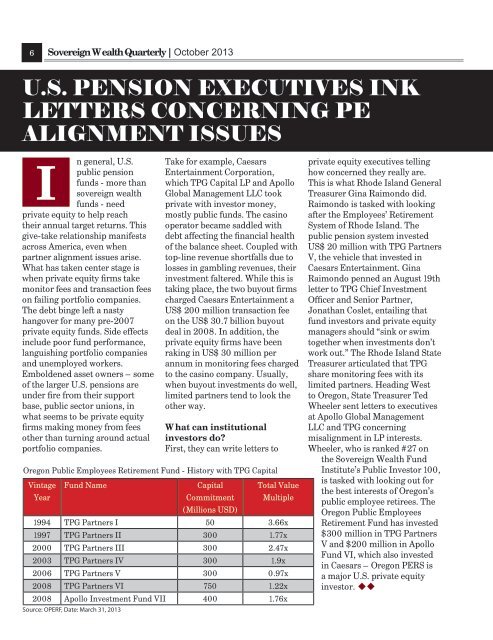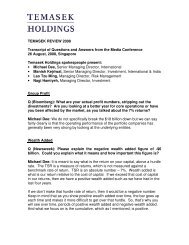Sovereign Wealth Quarterly - Sovereign Wealth Fund Institute
Sovereign Wealth Quarterly - Sovereign Wealth Fund Institute
Sovereign Wealth Quarterly - Sovereign Wealth Fund Institute
Create successful ePaper yourself
Turn your PDF publications into a flip-book with our unique Google optimized e-Paper software.
6 <strong>Sovereign</strong> <strong>Wealth</strong> <strong>Quarterly</strong> | October 2013<br />
U.S. Pension Executives Ink<br />
Letters Concerning PE<br />
Alignment Issues<br />
n general, U.S.<br />
I<br />
public pension<br />
funds - more than<br />
sovereign wealth<br />
funds - need<br />
private equity to help reach<br />
their annual target returns. This<br />
give-take relationship manifests<br />
across America, even when<br />
partner alignment issues arise.<br />
What has taken center stage is<br />
when private equity firms take<br />
monitor fees and transaction fees<br />
on failing portfolio companies.<br />
The debt binge left a nasty<br />
hangover for many pre-2007<br />
private equity funds. Side effects<br />
include poor fund performance,<br />
languishing portfolio companies<br />
and unemployed workers.<br />
Emboldened asset owners – some<br />
of the larger U.S. pensions are<br />
under fire from their support<br />
base, public sector unions, in<br />
what seems to be private equity<br />
firms making money from fees<br />
other than turning around actual<br />
portfolio companies.<br />
Take for example, Caesars<br />
Entertainment Corporation,<br />
which TPG Capital LP and Apollo<br />
Global Management LLC took<br />
private with investor money,<br />
mostly public funds. The casino<br />
operator became saddled with<br />
debt affecting the financial health<br />
of the balance sheet. Coupled with<br />
top-line revenue shortfalls due to<br />
losses in gambling revenues, their<br />
investment faltered. While this is<br />
taking place, the two buyout firms<br />
charged Caesars Entertainment a<br />
US$ 200 million transaction fee<br />
on the US$ 30.7 billion buyout<br />
deal in 2008. In addition, the<br />
private equity firms have been<br />
raking in US$ 30 million per<br />
annum in monitoring fees charged<br />
to the casino company. Usually,<br />
when buyout investments do well,<br />
limited partners tend to look the<br />
other way.<br />
What can institutional<br />
investors do<br />
First, they can write letters to<br />
Oregon Public Employees Retirement <strong>Fund</strong> - History with TPG Capital<br />
Vintage<br />
Year<br />
<strong>Fund</strong> Name<br />
Capital<br />
Commitment<br />
Total Value<br />
Multiple<br />
(Millions USD)<br />
1994 TPG Partners I 50 3.66x<br />
1997 TPG Partners II 300 1.77x<br />
2000 TPG Partners III 300 2.47x<br />
2003 TPG Partners IV 300 1.9x<br />
2006 TPG Partners V 300 0.97x<br />
2008 TPG Partners VI 750 1.22x<br />
2008 Apollo Investment <strong>Fund</strong> VII 400 1.76x<br />
Source: OPERF, Date: March 31, 2013<br />
private equity executives telling<br />
how concerned they really are.<br />
This is what Rhode Island General<br />
Treasurer Gina Raimondo did.<br />
Raimondo is tasked with looking<br />
after the Employees’ Retirement<br />
System of Rhode Island. The<br />
public pension system invested<br />
US$ 20 million with TPG Partners<br />
V, the vehicle that invested in<br />
Caesars Entertainment. Gina<br />
Raimondo penned an August 19th<br />
letter to TPG Chief Investment<br />
Officer and Senior Partner,<br />
Jonathan Coslet, entailing that<br />
fund investors and private equity<br />
managers should “sink or swim<br />
together when investments don’t<br />
work out.” The Rhode Island State<br />
Treasurer articulated that TPG<br />
share monitoring fees with its<br />
limited partners. Heading West<br />
to Oregon, State Treasurer Ted<br />
Wheeler sent letters to executives<br />
at Apollo Global Management<br />
LLC and TPG concerning<br />
misalignment in LP interests.<br />
Wheeler, who is ranked #27 on<br />
the <strong>Sovereign</strong> <strong>Wealth</strong> <strong>Fund</strong><br />
<strong>Institute</strong>’s Public Investor 100,<br />
is tasked with looking out for<br />
the best interests of Oregon’s<br />
public employee retirees. The<br />
Oregon Public Employees<br />
Retirement <strong>Fund</strong> has invested<br />
$300 million in TPG Partners<br />
V and $200 million in Apollo<br />
<strong>Fund</strong> VI, which also invested<br />
in Caesars – Oregon PERS is<br />
a major U.S. private equity<br />
investor. uu



